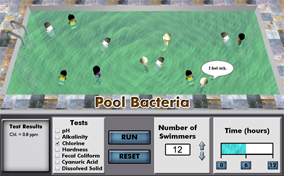How does the number of swimmers affect the quality of a swimming pool?
Swimmers are the primary source of bacteria in pools. Swimmers introduce ammonia, found in waste products, into pools. When there are a large number of swimmers in a pool and the pH is relatively low, the ammonia can combine with free chlorine in the pool and form chloramines. Chloramines can cause eye irritation, skin discomfort, and chlorine-like odors, in addition to not being effective disinfectants. To fix this problem, a large amount of chlorine must be added to the pool.
What is the function of chlorine in a swimming pool?
Chlorine kills bacteria in pools through a chemical reaction that occurs when the chlorine comes in contact with the water. The chlorine breaks down into many different substances, including hypochlorous acid and hypochlorite ion. These kill microorganisms and bacteria by killing the enzymes and destroying the structures in their cells.
How does the time of day affect the quality of a swimming pool?
Since swimmers are a major source of bacteria in pools, the more swimmers that swim in a pool, the more bacteria are introduced. As the time of day gets later, the amount of bacteria increases because more swimmers have used the pool. In addition, the UV rays in sunlight break down chlorine so that it is ineffective at killing bacteria. As the day progresses, the pool receives more sunlight, and more and more chlorine is broken down unless a stabilizer is added to the pool. A stabilizer slows down the rate of chlorine reaction in the water so that the chlorine levels are kept in an appropriate range.
How does cyanuric acid affect the quality of a swimming pool?
Cyanuric acid is a common stabilizer found in pools. The stabilizer slows down the rate of chlorine reaction in the water to keep the chlorine from being broken down by sunlight and losing its effectiveness. If there is too little stabilizer in the pool, the chlorine will be very effective at killing bacteria, but the chlorine levels will rapidly decrease because it is being broken down by the sunlight. If there is too much stabilizer in the pool, the chlorine level will remain constant, but the chlorine will be ineffective at killing bacteria.
What is pH?
The pH is the measurement of how basic or acidic the water in a pool is. The pH scale ranges from 1 to 14. Pure water has a pH of 7, which is neutral. A lower pH means the liquid is acidic, and a higher pH means the liquid in question is basic. The pH of a pool should be between 7.2 and 7.8. The pH of pool water directly affects swimmer comfort and the effectiveness of chemicals in the pool. A pH outside of this preferred range can irritate skin and damage pool equipment. If the pH of the water in a pool is too high, chlorine becomes less effective at killing bacteria.
What is total alkalinity?
Total alkalinity (TA) is the measurement of the amount of alkaline substances in the water. The total alkalinity is how much the water resists changes to its pH. The TA should be between 80 and 120 parts per million. If the total alkalinity of the pool water is too low, pool equipment can be damaged, the floor and walls can stain, the pH will change rapidly and drastically, and the pool can turn green and irritate swimmers' eyes. If the TA is too high, the pH is hard to adjust, the pool water becomes cloudy, and chlorine is not as effective as usual. In healthy pools, the TA typically stays constant. However, if the TA is wrong, returning the pool to a normal TA level is a long and slow process that can take days or weeks.
How does water hardness affect the quality of a swimming pool?
Water hardness is the concentration of calcium carbonate. Water that has a high concentration of calcium carbonate is considered "hard" water. The high concentration of calcium carbonate comes from the water absorbing calcium and magnesium as it travels through rocks and soil. It is important for pool water to have an appropriate hardness. If the water is too soft, it can dissolve the plaster and metal parts of the pool. If the water is too hard, the water can cause scale formation on pool surfaces and make the water cloudy.
What are dissolved solids in a swimming pool?
Total dissolved solids, or TDS, is the total amount of substances that are dissolved in the pool water. The TDS level should be between 1,000 ppm and 2,000 ppm, and can be monitored with test strips. If the TDS level is above 2,000 ppm, it becomes very difficult to balance the chemicals in the pool. If this happens, the best way to fix the problem is to partially drain the pool and refill it with new water.
What are fecal coliforms?
Fecal coliform bacteria are bacteria that come from the feces of warm blooded animals. The most common type of bacterium in fecal coliforms is Escherichia coli, or E. coli. If fecal coliforms are present in water, it means that the water has been contaminated with fecal matter. Fecal coliforms in pool water can lead to the spread of Recreational Water Illnesses, or RWI, such as gastrointestinal, skin, respiratory, and wound infections. The limit for the amount of fecal coliforms in swimming water is 200 fecal coliforms per 100 milliliters of water. The bacteria can be killed by adding chlorine, but it takes time for the chlorine to kill the bacteria. When there is a fecal accident in a pool, it must be closed to swimmers for a certain period of time to allow the chlorine to do its job. The amount of time the pool must be closed depends on the type of accident and the chlorine levels in the pool. For a fecal accident involving solid stools, the pool must be closed for an average of 30 minutes. An accident involving diarrhea can close a pool for 12 hours.
What is Henry's Law?
Henry's Law states that at a constant temperature, the solubility of a gas dissolved in a liquid is directly proportional to the partial pressure above the liquid. However, increasing the temperature changes the Henry's Law coefficient and reduces the solubility of the gas in the solution.
 You’re all ready for a big day at the local swimming pool. The Sun is blaring and the weather is scorching. Bathing suit, check. Sunscreen, check. Pool toys, check. You head to the pool and are met with a sign that says, "Pool Closed Due to High Bacteria Levels." Poor water quality ruined your day at the pool. What could have been done to keep this pool closure from happening? Are you ready to take the plunge to find out? Well, let’s dive in!
You’re all ready for a big day at the local swimming pool. The Sun is blaring and the weather is scorching. Bathing suit, check. Sunscreen, check. Pool toys, check. You head to the pool and are met with a sign that says, "Pool Closed Due to High Bacteria Levels." Poor water quality ruined your day at the pool. What could have been done to keep this pool closure from happening? Are you ready to take the plunge to find out? Well, let’s dive in!

